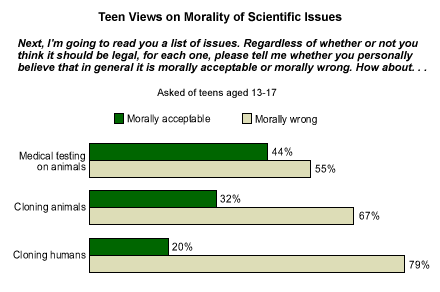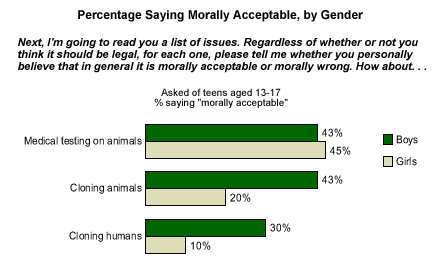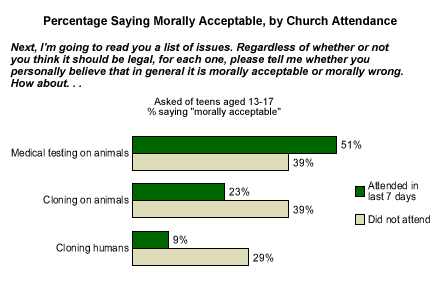Although today's teenagers have been reared during a time of galloping advances in bioengineering that include the successful cloning of mammals, they are somewhat unsure about the morality of several controversial scientific practices.
The August 2003 Gallup Youth Survey* asked teens (aged 13 to 17) whether several scientific procedures -- medical testing on animals, cloning animals, and cloning humans -- are morally acceptable or morally wrong. For each of the three issues tested, majorities of teens said that they are morally wrong. The highest rating of moral acceptability is for medical testing on animals at 44%. The lowest is for cloning humans, which only 20% of teens feel is morally acceptable.

Meghan, a 17-year-old high school senior from Madison, Wis., expresses some of the mixed feelings teens may have on the issue of medical testing on animals. She condemns using laboratory animals for testing cosmetics and household products, but feels that using animals for medical research purposes is "morally acceptable if you are trying to better the lives of humans."
Opinions by Subgroup
Boys and girls share similar views on medical testing on animals, but girls are less likely than boys to find cloning acceptable. Twice as many boys (43%) as girls (20%) feel that cloning animals is morally acceptable, and three times as many boys (30%) as girls (10%) feel that cloning humans is morally acceptable.

As one might expect, attitudes also vary widely among teens who attend church or synagogue on a weekly basis and those who do not. Churchgoing teens are far less likely than non-churchgoers to feel that cloning animals is morally acceptable (23% compared to 39%). The same goes for cloning humans -- 9% of churchgoers find it morally acceptable, as do 29% of non-churchgoers. However, churchgoing teens are significantly more likely to find medical testing on animals morally acceptable (51%) than non-churchgoing teens are (39%).

Bottom Line
Teens are most negative on the issue of human cloning, but it is still somewhat surprising that 20% find it morally acceptable. It may be that some teens view it as a strictly scientific issue, rather than a moral issue.
"I don't see it [human cloning] as a moral issue," says Rob, a 15-year-old high school sophomore from Long Island, N.Y. "It's simply a scientific fact now. The ability to do it exists and it's going to happen. If you asked people 50 years ago if they wanted to produce babies in a laboratory -- of course, they would have said no. But it continues to be a brave new world and you can't stop progress."
*The Gallup Youth Survey is conducted via an Internet methodology provided by Knowledge Networks, using an online research panel that is designed to be representative of the entire U.S. population. The current questionnaire was completed by 517 respondents, aged 13 to 17, between Aug. 1 and Aug. 29, 2003. For results based on the total sample, one can say with 95% confidence that the maximum margin of sampling error is ±5 percentage points.
